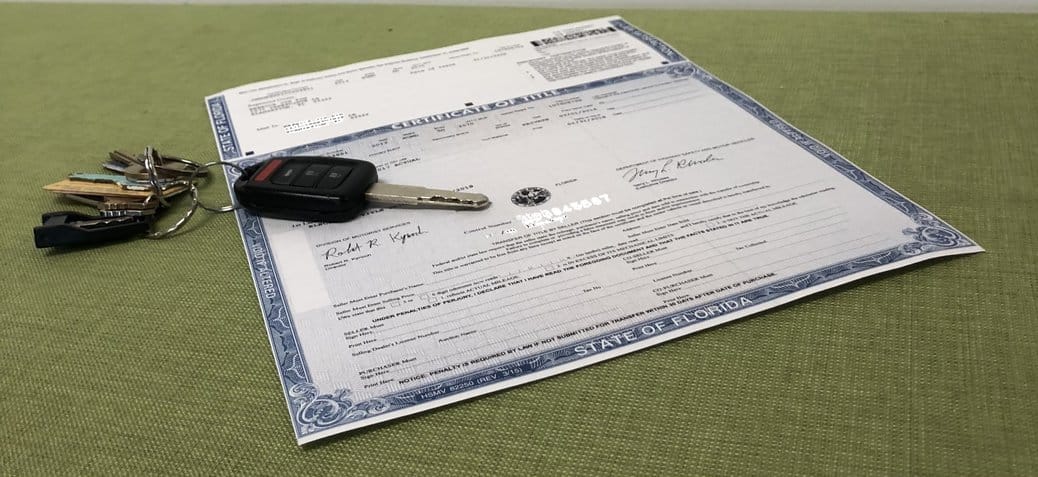
Is a Duplicate Title Bad?
A duplicate title is a document obtained after the original title is stolen, lost, disfigured, rendered illegible, or destroyed. The document has the word “DUPLICATE” printed on the front and is only issued by the Department of Motor Vehicle. The prior title becomes void once the new one is given. If the original title is discovered, it should be destroyed to guarantee that it is not utilized in any vehicle sales or ownership transfers.
The importance of having a duplicate title stems from the fact that it prevents someone else from attempting to steal your car using the old title. If someone tries, the state agency handling the title transfer will notice that the document is out of date and will cancel the transaction. You can purchase a duplicate title using any of the following options:
- MyBMV.com
- BMV Connect Kiosk
- BMV Branch
- BMV Full or Partial Service Provider
What is Included in a Duplicate Title?
The vehicle identifying information on a duplicate title includes the car’s make, model, year, and identification number. It also consists of the following information:
- Registration date of the car
- The car’s value
- The owner’s full and legal names.
- The owner mailing address
- Whether or not the vehicle owner is a military official
- Whether the car is for business or personal use.
How Can You Apply For a Duplicate Title?
You must fill out the Application for Duplicate Title Form if you are looking for a duplicate title. The vehicle’s license plate number, your full legal name, your physical address, and your driving license number are all required fields on the form. In addition, sign the factual statement describing what occurred to your original title. If the title was damaged, you should also include it.
You must also pay a replacement charge before submitting the form. The form can be mailed or delivered in-person to your local DMV office. If you opt to make your request to the DMV in person, you must have your driver’s license with you.
Is It Possible To Sell a Car Without a Title?
In the United States, a car title is legal proof of ownership of a vehicle. In most instances, it is illegal to sell a car if you do not have a car title. However, if you misplaced or destroyed it, you can apply for a duplicate title at your local DMV.
On the other hand, if you financed your vehicle and have not finished paying it off, you’ll need to get the title from the lender or lienholder if it has a lien. Some states also will not issue you a title for your older vehicle. However, a bill of sale should suffice to transfer ownership in these circumstances. Below are some ways on how you can sell your car without a title.
Method 1: Applying For a New Title
As previously indicated, selling an automobile that is not a title exemption without a title is prohibited. As a result, it is recommended that you replace your title before negotiating the sales.
If you never title the car, you will be forced to present proof of ownership to obtain a new title. Thus, you’ll need to locate your original bill of sale to do so. Next, check which documents your state considers valid proof of ownership if you don’t have the bill of sale. You may also be required to show confirmation that the car is in excellent working order by your state. If that’s the case, you’ll need to get an inspection certificate from a state-approved inspector.
If your vehicle qualifies for a duplicate title, go to your local DMV website and apply for a duplicate title using the processes outlined previously in this article. You can also check to see if your state allows ownership transfers without a title. That is because some states may permit car buyers to apply for a temporary permit that will enable them to drive the automobile while they wait for a duplicate title to be issued.
Method 2: Selling a Title-Exempt Vehicle
If your car is old and you’ve lost the original title, try and see if your state offers a title-exempt bill of sale form. Some states, which do not provide titles for older vehicles, have a standardized bill of sale form that buyers must present when registering a car. If your state does not offer a bill of sale form, you can make one yourself.
Even though just a few states demand a notarized bill, make sure to do so. It will make the buyer’s registration process go more smoothly. To have the bill notarized, both you and the buyer must go to a notary public and sign the bill of sale jointly.
Second, you must complete and submit your state’s title exemption form, as well as pay any necessary fees. Procedures differ from state to state. A transfer of ownership paperwork may be required of you, the buyer, or both of you. However, in some states, the buyer can register the car with a bill of sale without you having to do anything further.
Finally, if the buyer is from another state, it is critical to establish that they can register the exempt car. If the bill of sale is notarized, it should suffice for a buyer to apply for a new title in their state. You may also be required to give an affidavit attesting to your status as the prior owner, a copy of the vehicle’s registration from the time you owned it, or other evidence to the buyer’s local DMV.
